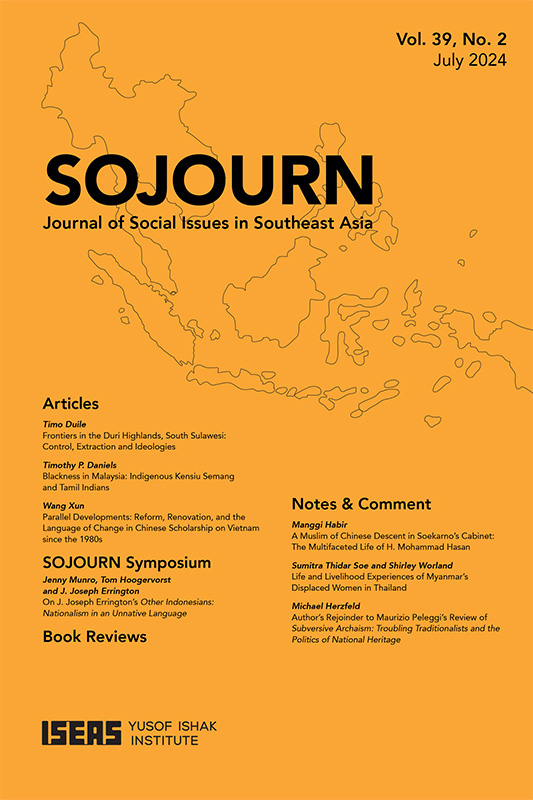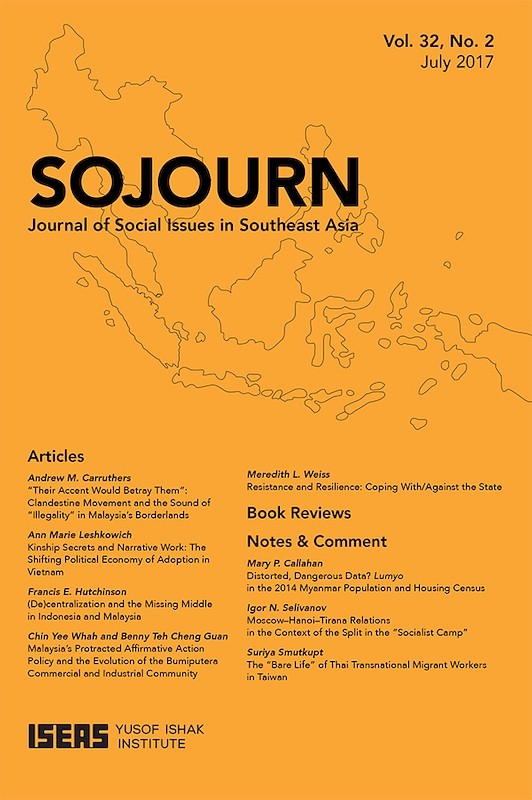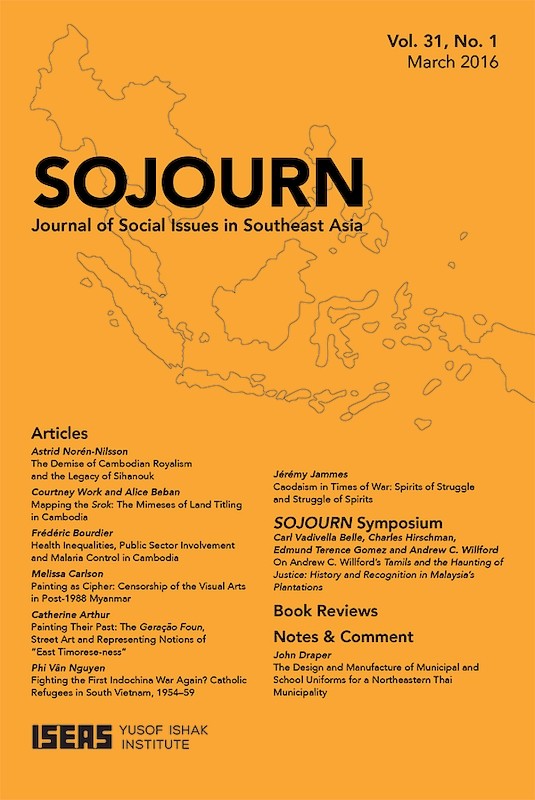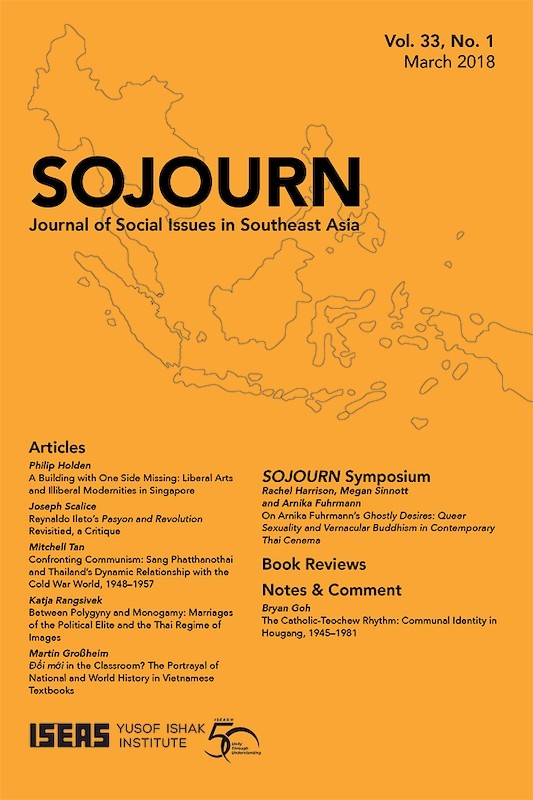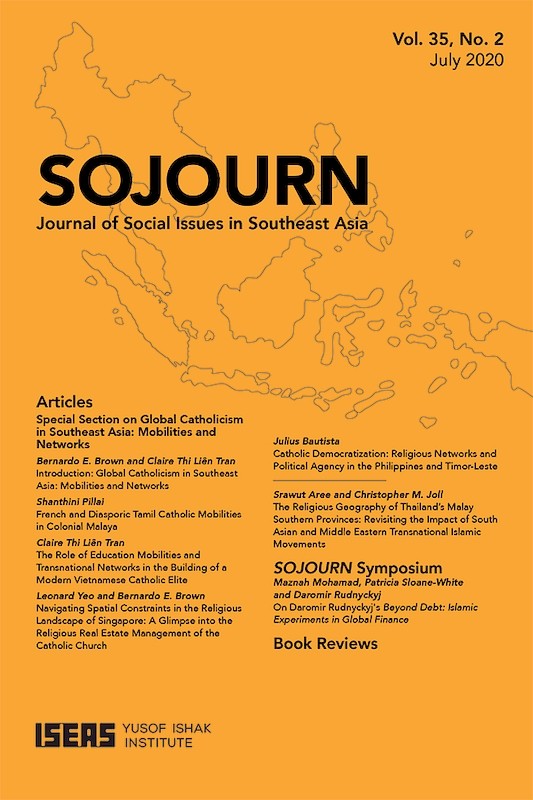SOJOURN: Journal of Social Issues in Southeast Asia Vol. 38/1 (March 2023)
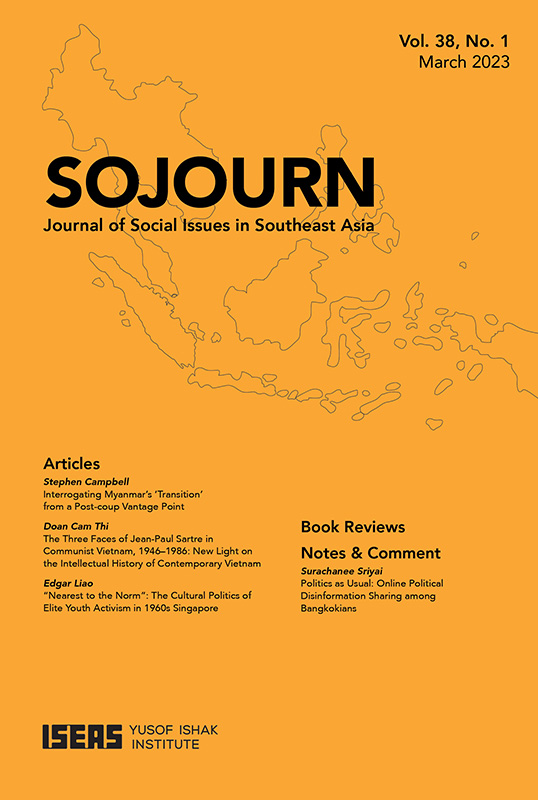
Date of publication:
March 2023
Publisher:
ISEAS – Yusof Ishak Institute
Number of pages:
132
Code:
SJ38/1
Soft Cover
ISSN: 02179520
Contents
-
SOJOURN: Journal of Social Issues in Southeast Asia Vol. 38/1 (March 2023)
[Whole Publication, ISSN: 17932858] -
Preliminary pages
- ARTICLES
-
Interrogating Myanmar’s ‘Transition’ from a Post-coup Vantage Point, by Stephen Campbell, author see abstractThe February 2021 military coup in Myanmar appears to have rendered null the many projections, proposals and prognostications that academics advanced over the preceding decade—the period of ‘democratic transition’, as it was then optimistically regarded. But perhaps when considered from a post-coup vantage point those earlier analyses, which tell of the tensions and trajectories of the transition-era, can be made to speak to the political knots and contradictions that underlay the coup and that continue to haunt the post-coup moment. So motivated, this article revisits the 2020 volume Unraveling Myanmar’s Transition, edited by Pavin Chachavalpongpun, Elliott Prasse-Freeman and Patrick Strefford. The article proposes three overlapping frames for making sense of Myanmar’s transition: seeing that period as one of structural adjustment, of an inter-elite pact and of an imperialist project.
-
The Three Faces of Jean-Paul Sartre in Communist Vietnam, 1946–1986: New Light on the Intellectual History of Contemporary Vietnam, by Doan Cam Thi, author see abstractEven though we read a great deal about what Jean-Paul Sartre thought of his ‘Vietnamese friends’, we know almost nothing about what they thought of him. This article draws upon a wealth of untapped Vietnamese language sources to shed new light on communist Vietnam’s interpretations of Sartre, his philosophical ideas and his battles. These sources are closely linked to their historical and political context, not only in relation to the Indochina wars, but also as part of the Cold War. The study of interpretations of Sartre shows how his work and his commitments were exploited by the Vietnamese communist state in Hanoi by means of a powerful ideological apparatus in the service of its own struggles against France and the United States. What were the methods used by Vietnamese leaders? What do they reveal about communist Vietnam’s foreign policies and about internal differences within the country’s leadership? What roles did the Soviet Union, China, France and the United States play in this? How did Hanoi intellectuals act in the face of political power? How do their changing views of Sartre shed light on the intellectual history of contemporary Vietnam? In answering these questions, this article makes several original contributions not only to understanding the history of contemporary Vietnam but also that of the wider world in the twentieth century.
-
“Nearest to the Norm”: The Cultural Politics of Elite Youth Activism in 1960s Singapore, by Edgar Liao, author see abstractThe origins and impact of the cultural politics of youth in modern Singapore have been the subject of little study, even though the Singapore state’s policies and attitudes towards the young have had pervasive, long-lasting effects on the country’s politics, society and culture. Using the lesser-known history of activism among English-educated students in the University of Malaya across the 1960s, this article traces the meanings and significance that the Singapore government attached to elite English-educated youths and argues that the Singapore state sought to monopolize and localize youth agency, idealism and activism, instead of simply repressing them.
- BOOK REVIEWS
-
BOOK REVIEW: Safe Migration and the Politics of Brokered Safety in Southeast Asia by Sverre Molland, by Sallie Yea, author
-
BOOK REVIEW: The City and the Wilderness: Indo-Persian Encounters in Southeast Asia by Arash Khazeni, by Faizah Zakaria, author
-
BOOK REVIEW: Myanmar’s Rohingya Genocide: Identity, History and Hate Speech by Ronan Lee, by Jacques P Leider, author
-
BOOK REVIEW: Belittled Citizens: The Cultural Politics of Childhood on Bangkok’s Margins by Giuseppe Bolotta, by Balawansuk Lynrah, author
-
BOOK REVIEW: Thai Politics in Translation: Monarchy, Democracy and the Supra-constitution, edited by Michael K. Connors and Ukrist Pathmanand, by Michael J Montesano, author
-
BOOK REVIEW: Black Market Business: Selling Sex in Northern Vietnam, 1920–1945 by Christina Elizabeth Firpo, by Richard Quang-Anh Tran, author
-
BOOK REVIEW: Alluring Monsters: The Pontianak and Cinemas of Decolonization by Rosalind Galt, by Norman Yusoff, author
-
BOOK REVIEW: Empire of Convicts: Indian Penal Labor in Colonial Southeast Asia by Anand A. Yang, by Rajesh Rai, author
- NOTES & COMMENT
-
Politics as Usual: Online Political Disinformation Sharing among Bangkokians, by Surachanee Sriyai, author see abstractThis note presents preliminary results of research seeking to understand the dynamics of political disinformation by means of a quasi-experimental survey of some 1,500 eligible voters residing in Bangkok, Thailand. The results show that positive psychological engagement and partisanship, particularly among those at the extreme ends of the ideological spectrum, are the key factors that drive individuals to share political disinformation online. They indicate that partisan polarization—a scenario thought to be exclusive to strong, two-party systems—can have a discernible impact on the tendency of a person to share false information even in multiparty systems in which parties lack clearly distinguishable policy platforms.

